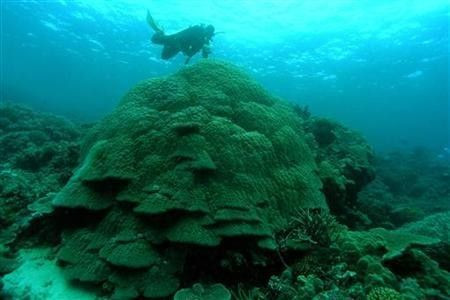Great Barrier Reef health report: Pollution mitigation targets still trailing

The health of Great Barrier Reef continues to be a matter of concern and is yet to stabilise. The latest report card by the government shows that there is only marginal progress in achieving water quality targets, validating some of the concerns expressed by UNESCO about the reef's plight, according to the Queensland government.
The overall condition at the Reef's inshore marine environment remains poor. Though some marginal progress is visible in curtailing run-off from sediments, nutrients and pesticide loads, Queensland is still far away from meeting the desired targets, the AAP reported.
“If one of my kids came home with a report card like this, I'd be a bit disappointed,” commented Queensland Environment Minister Steven Miles.
In June, UNESCO had agreed not to place the Reef on its "in danger" list and spared the state and federal governments from a huge embarrassment. But UNESCO has demanded that Australia must submit an update for its Reef 2050 plan to the World Heritage Centre by December 2016.
Mixed bag
The report card showed that voluntary best-management practices within agriculture sectors have been a mixed bag. While the grain industry exceeded its targets, the sugar cane sector is languishing.
Minister Miles insisted that his government offered many expensive incentives to encourage the accomplishment of targets. However, some encomoums have come from a couple of experts. Agforce General President Grant Maudsley claimed that the number of graziers participating in best-management practices has doubled while chairman of the Great Barrier Reef Marine Park Authority, Russell Reichelt, praised farmers for cutting down on the use of fertilisers. “I genuinely think they are making a difference,” he said.
Federal Environment Minister Greg Hunt also saw many positives in the report, which included the reported recovery in inshore sea-grass in some areas. “It takes time for improvements in land management to translate into measurable outcomes in marine condition,” he said.
The state environment minister blamed the former Newman government's reef policies for the slow progress and said the targets got stalled in 2013-14. But this was contested by deputy Opposition Leader John-Paul Langbroek, who said it did more work than any other previous governments.
Challenging target
However, the high targets came in for criticism from agriculturists. Cane growers environment manager Matt Kealley said the target to reduce nitrogen run-off by 80 percent by 2025 is a challenging one, ABC News reported.
"I'm not sure if we'll meet them, but obviously the industry is there to play its part and do its part to try and get to improve water quality for the reef," he said.
Calling up all agriculture segments to play a part in the task, Kealley urged the industry as well as community groups to optmise their contribution with combined efforts.
“I don't agree with most of the nutrients coming from the sugar cane industry, we play our part, and we're improving our practice all the time,” Kealley claimed.
For feedback/comments, contact the writer at feedback@ibtimes.com.au or let us know what you think below.





















